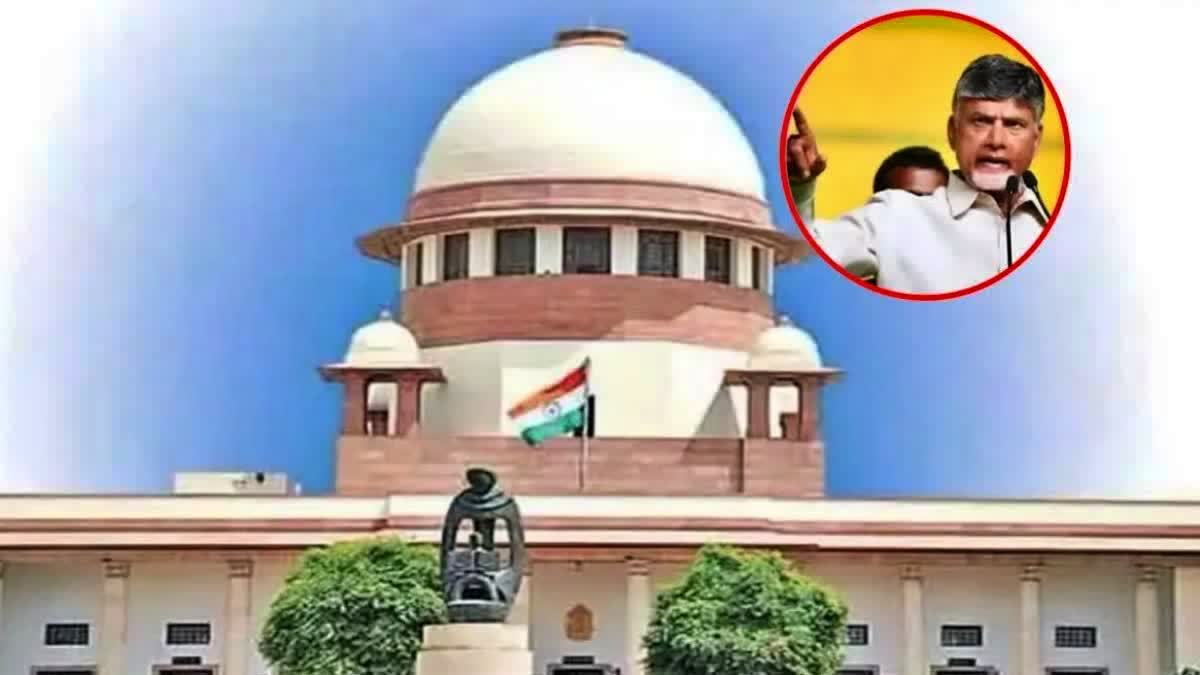New Delhi: The Supreme Court Tuesday delivered a split judgment on a petition by former Andhra Pradesh Chief Minister N Chandrababu Naidu, seeking a direction to quash the corruption case filed against him in the alleged skill development scam case. The matter is now referred to the CJI for setting up a larger bench on the applicability of Section 17A, which mandates prior approval before investigating a public servant.
A bench comprising justices Aniruddha Bose and Bela M Trivedi differed on applicability of Section 17A of Prevention of Corruption (PC) Act. Justice Trivedi said the matter will have to be referred to a larger bench.
Justice Aniruddha Bose, while pronouncing his judgement, said Chandrababu Naidu can’t be proceeded against for offences under 13(1)(c) and 13(1)(d) and 13(2) under the PC Act as no previous approval of the concerned authority has been obtained.
Justice Bose declined to quash the remand order. He said lack of approval will not make the remand order non- est. Justice Bela M Trivedi said she has a different view.
Justice Trivedi said the statute cannot be applied retrospectively unless expressly stated and the 2018 amendment was only made effective from the specified date, it cannot be made retrospective or retroactive.
The two-judge bench has referred the matter to the Chief Justice of India D Y Chandrachud on the administrative side for setting up a larger bench on the applicability of Section 17A, which mandates prior approval before investigating a public servant.
However, the two judges have agreed on the issue that there were no infirmities in the remand order, since Naidu was also charged with offences under the IPC.
The apex court pronounced the judgement on a special leave petition filed by the TDP chief against the Andhra Pradesh High Court's order of September 22, 2023 denying him the relief. Naidu had questioned his arrest and lodging of an FIR in connection with Rs 3,300 crore scam in setting up skill development centres.
The apex court declined the plea by Naidu seeking quashing of the FIR registered against him in the Andhra Pradesh skill development programme scam case.
Justice Bose said that complying with the requirement of prior sanction under Section 17A is necessary and such sanction should be there in connection with acts prior to 2018, when Section 17A was inserted. He said absence of approval will not render the remand order passed by the magistrate non-est.
Justice Trivedi said that Section 17A which was inserted in 2018 is prospective in its application and cannot be made applicable retrospectively. She stressed that this section cannot be used as a ground to protect dishonest public servants, saying "I disagree on the interpretation of Section 17A".
Justice Trivedi said the Act is aimed at addressing corruption and its goal is to protect honest public servants from harassment. "The object cannot be to give benefit to dishonest public servants and making it retrospectively applicable will frustrate the object of PC Act…..," she said.
Justice Trivedi added that absence of approval cannot become a ground to quash the FIR especially when he is charged under other PC Act offences as well. The two-judge has referred the matter to a larger bench on the aspect of interpretation of Section 17A.
Naidu was represented by senior advocates Harish Salve, Sidharth Luthra, Dammalpati Srinivas, Pramod Kumar Dubey and Siddharth Aggarwal. The Andhra Pradesh government was led by senior advocate Mukul Rohatgi, Ranjit Kumar and Jaydeep Gupta, S Niranjan Reddy among others.
Naidu's petition challenged his arrest on September 8, 2022 in the 2021 FIR lodged by Crime Investigation Department (CID) related to setting up skill development centres across the state.
The High Court had refused to quash the FIR lodged on December 9, 2021 and order of his judicial remand in a case related to setting up skill development centres. Last year in November, Naidu was granted regular bail.
- " class="align-text-top noRightClick twitterSection" data="">
Read More




